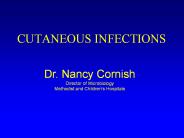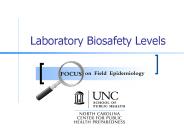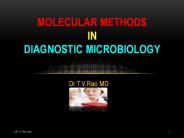Francisella Tularensis Infections PowerPoint PPT Presentations
All Time
Recommended
RnRMarketResearch.com adds “Francisella Tularensis Infections Pipeline Review, H2 2014” to its store. This report provides comprehensive information on the therapeutic development for Francisella Tularensis Infections, complete with comparative analysis at various stages.
| PowerPoint PPT presentation | free to download
Francisella tularensis Tularemia Francisella tularensis Gram stain Poorly staining, tiny Gram-negative coccobacilli Francisella tularensis - One of the most ...
| PowerPoint PPT presentation | free to download
Gram-negative rod, pleomorphic (coccoid to filamentous) ... and of the hare. Infection. Infected insect bite. Contact of abraded skin with infected material ...
| PowerPoint PPT presentation | free to view
can be easily disseminated or transmitted from person to person; ... Start codon primer. Stop codon primer ~ 1000 bp. Wild-type gene. 200 bp. 1000 bp. mutant ...
| PowerPoint PPT presentation | free to view
... of FT WT and C23 MT. ... The C23 MT clone is labeled O and the WT ones O. PCR analysis of C23 ... Only C23 MT DNA in combined DNA of row A and of column 4 ...
| PowerPoint PPT presentation | free to view
Title: Chlamydia and N. Gonorrhoeae Laboratory Detection by DNA Amplication Author: MSUSER Last modified by: ncornis Created Date: 10/2/2001 7:41:28 PM
| PowerPoint PPT presentation | free to download
... in co-existing suburban and rural rodent populations on the outskirts of some ... provide food and shelter for plague-susceptible rodents near human dwellings ...
| PowerPoint PPT presentation | free to view
Treatment of all clostridial infections is wide surgical debridement and ... ALL YOU CAN EAT?? I'M THERE! ... Untreated BA can be fatal ...
| PowerPoint PPT presentation | free to view
Trachael cytotoxin is related to the B.pertussis peptidoglycan. ... Small g-cb that stain poorly. Brucella. Nonmotile. Nonencapsulated ...
| PowerPoint PPT presentation | free to view
... by fleas (organisms blocks digestive tract of fleas (makes ... Virulence factors. Table 28.4. Infected fleas. Figure 28.7. Features of plague. Table 28.5 ...
| PowerPoint PPT presentation | free to view
Yersinia Brucella Zoonosis Francisella * * * * * Lymphadenopath could be from Francisella tularensis (Ulceroglandular or Glandular) or Yersinia pestis (bubonic).
| PowerPoint PPT presentation | free to download
Mice, rats, hamsters, gerbils, ferrets, guinea pigs, rabbits, others (up to 8 species ... Immunomodulator (compound X) protects against lethal plague infection ...
| PowerPoint PPT presentation | free to view
Streptococcus pyogenes Francisella tularensis Ricketsia rickettsii Gram negative coccobacillus Obligate intracellular parasites symptoms : fever, nausea, vomiting ...
| PowerPoint PPT presentation | free to view
Tularemia is referred to be as a rare infectious disease that is caused by a bacterium called Francisella tularensis. The disease spreads in humans through various routes, including insects (deer fly and tick) bites and direct exposure to an infected animal.
| PowerPoint PPT presentation | free to download
The art and science of preventing. disease and disability, prolonging life, ... Smallpox (variola major) Tularemia (Francisella tularensis) ...
| PowerPoint PPT presentation | free to view
Tularemia Rabbit Fever Francisella tularensis Michelle Lawrence Elizabeth Stolarczuk What is Tularemia? One of the most infectious pathogenic bacteria known ...
| PowerPoint PPT presentation | free to view
b) E. coli, enteropathogenic. 13. Francisella tularensis. 14. FSME-Virus. 15. Yellow fever virus ... Infectious enteritis among food handlers. Outbreaks of ...
| PowerPoint PPT presentation | free to view
Tularemia is also known as deerfly fever or rabbit fever is an infectious disease caused by the gram-negative bacteria francisella tularensis that infects wild rodents, squirrels, birds, rabbit and can infect the human by direct contact with an infected animal or from tick, mosquito, or deer fly bites. It can cause a severe flu-like illness and long-term health problems.
| PowerPoint PPT presentation | free to download
... molecular typing and susceptibility patterns identical to ... Developing methods for signal ... data (23) Systems for nosocomial infections ...
| PowerPoint PPT presentation | free to download
Board Review Paul O Keefe April 16, 2003 Skin/Soft Tissue Infections Impetigo Cellulitis Fasciitis Impetigo Group A streptococcus, Staphylococcus arueus Superficial ...
| PowerPoint PPT presentation | free to download
Board Review Paul O Keefe April 16, 2003 Skin/Soft Tissue Infections Impetigo Cellulitis Fasciitis Impetigo Group A streptococcus, Staphylococcus arueus Superficial ...
| PowerPoint PPT presentation | free to download
Lyme Disease. Question 3. A 5 year-old presents with. migratory arthritis and. shortness of breath. ... Lyme Disease. Key Points #3. Group A Streptococcus infections ...
| PowerPoint PPT presentation | free to download
What Practitioners Need to Know. Infections Medicine 497-515 2001 ... gentamicin, tetracycline, fluoroquinolones, and chloramphenicol may be ...
| PowerPoint PPT presentation | free to view
Individuals with viral infections (e.g, cold sores) should wash their hands thoroughly. ... Cold Sores, Fever Blisters, Herpes labialis ...
| PowerPoint PPT presentation | free to view
Lower respiratory tract infections due to specific ... Acute infection fourfold rise in IgG titer, a single IgM titer 16, or a single IgG titer 512. ...
| PowerPoint PPT presentation | free to view
Gram-positive bacteria: Staphylococci Staphylococcus aureus Staphylococcus aureus http://www.visualdxhealth.com/pdfs/MRSA%20Handout.pdf Superantigens http://highered ...
| PowerPoint PPT presentation | free to download
Vibrio parahaemolyticus Forms GREEN non-sucrose fermenting agars ... -The name
| PowerPoint PPT presentation | free to view
Please click audio icon to hear Carol s narration Fastidious Gram Negative Rods Respiratory II Clinical Laboratory Science Program Carol Larson MSEd, MT(ASCP)
| PowerPoint PPT presentation | free to download
Cephalosporins Base molecule is 7-aminocephalosporanic acid produced by a Sardinian sewer mold R groups determine spectrum of activity and pharmacological ...
| PowerPoint PPT presentation | free to view
Role of dipterans in vector-borne diseases. Japanese encephalitis serocomplex ... Not common house fly. Aquatic larval forms (important for control) ...
| PowerPoint PPT presentation | free to download
Personnel specifically trained in handling pathogenic agents ... 1968 Carmichael - Beagles, B. canis. 52. BRUCELLOSIS: TRANSMISSION. Unpasteurized dairy products ...
| PowerPoint PPT presentation | free to view
Gram negative rods and cocci Endotoxin: Lipid A, the superantigen Part of LPS of the Gram negative outer membrane Causes an over-stimulation of macrophages with ...
| PowerPoint PPT presentation | free to download
Title: I. Introduction to class Author: Multimedia Development Lab Last modified by: Angela Echeverru Created Date: 6/17/1995 11:31:02 PM Document presentation format
| PowerPoint PPT presentation | free to download
Contemporary Challenges to the Immune System
| PowerPoint PPT presentation | free to view
... of cats or dogs, or lions or tigers - ya, it said that! ... Colony morphology: 1-3 mm, gray-white to bluish-gray with a smooth flat surface at 48-72 hrs. ...
| PowerPoint PPT presentation | free to view
... were each loaded onto a hemacytometer and counted via phase contrast microscopy. ... was calculated using the average of the eight corner hemacytometer grids and ...
| PowerPoint PPT presentation | free to view
Terror Is Real !
| PowerPoint PPT presentation | free to download
Laboratory Biosafety Levels Goals Define barriers and procedures used by laboratories to protect workers and others from infection Describe the four biosafety levels ...
| PowerPoint PPT presentation | free to download
... y z { | } ~ P ... 456789:CDEFGHIJSTUVWXYZcdefghijstuvwxyz GpSs tFTO ...
| PowerPoint PPT presentation | free to download
Laboratory of Mycobacterial Diseases and Cellular Immunology ... Steven Derrick. Amy Li Yang. JaeHyun Lim. Kris Kolibab. Collaborators. AECOM. NIH/VRC. NIH/NCI ...
| PowerPoint PPT presentation | free to view
... -dependent manner. d | Monocytes differentiate into tumor ... of the immune system. ... Bacterial Immune Evasion Infection Process ...
| PowerPoint PPT presentation | free to view
Information for the Public Health Workforce Acknowledgements Diseases of Bioterrorist Potential: Tularemia & Viral Hemorrhagic Fevers Diseases of Bioterrorist ...
| PowerPoint PPT presentation | free to download
Bacterial Diseases Food Intoxication Clostridium perfringens Gastroenteritis: one of the more common forms of food poisoning in the United States improper handling of ...
| PowerPoint PPT presentation | free to view
... Introduction Borrelia burgdorferi Spiroch tose Syphilis Leptospirose Autres borr lioses ... Facteurs de risque du t tanos Vaccin + Ig ...
| PowerPoint PPT presentation | free to download
... which is often bloody May mimic appendicitis Eating contaminated food, especially raw or undercooked pork Outbreaks are described Usually self-limited ...
| PowerPoint PPT presentation | free to view
Prophylaxis of rheumatic fever and bacterial endocarditis. Lymphogranuloma venereum; chancroid ... Campylobacter jejuni gastroenteritis. Diphtheria carrier ...
| PowerPoint PPT presentation | free to view
People who travel to or migrate from rural areas of Latin America and the Middle East. Endemic in dairy animals, particularly goats and camels.
| PowerPoint PPT presentation | free to download
Communicable Diseases, Nosocomial Diseases, Emerging and ReEmerging Diseases
| PowerPoint PPT presentation | free to view
Haemophilus, Brucella and Bordetella Dr. Brian O Connell
| PowerPoint PPT presentation | free to view
... and identify the causative agents in a simulated urine culture and stool culture ... Blood. Stool culture plates. EMB. MAC. TSA. Blood. MSA. Urine cultures ...
| PowerPoint PPT presentation | free to view
Rx: antitoxin to neutralize free toxin in blood; respiratory assistance ... Follows broad-spectrum antibotic Rx that wipe out normal flora ...
| PowerPoint PPT presentation | free to view
work in farming facilities, where wild animals have been (tularemia by inhalation) ... inhaling airborne bacteria. Markku Seuri,FIOH, 2004. 7. TULAREMIA - 2 ...
| PowerPoint PPT presentation | free to view
Denied any animal or insect bite. Denied any travel outside of West Texas. ... Their clustered inclusion-like appearance in the host cell vacuoles is called a ...
| PowerPoint PPT presentation | free to view
Molecular methods in Diagnostic Microbiology
| PowerPoint PPT presentation | free to download
Zoonotic Diseases and Bioterrorism David A. Pegues, MD UCLA Medical Center Division of Infectious Diseases
| PowerPoint PPT presentation | free to view
... The presence of bacteria or fungi in the ... rRNA gene DNA extraction from colony or positive liquid PCR amplification ... Culture Gram Stain ...
| PowerPoint PPT presentation | free to view
























































